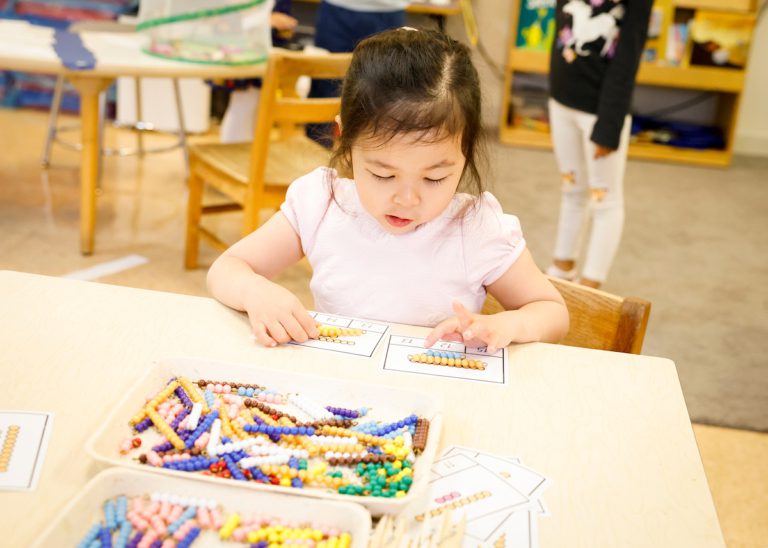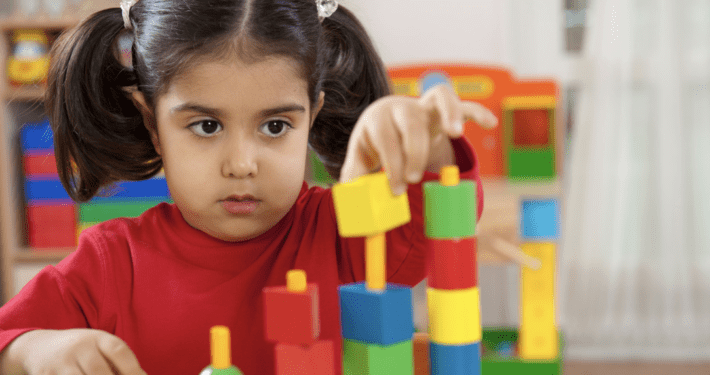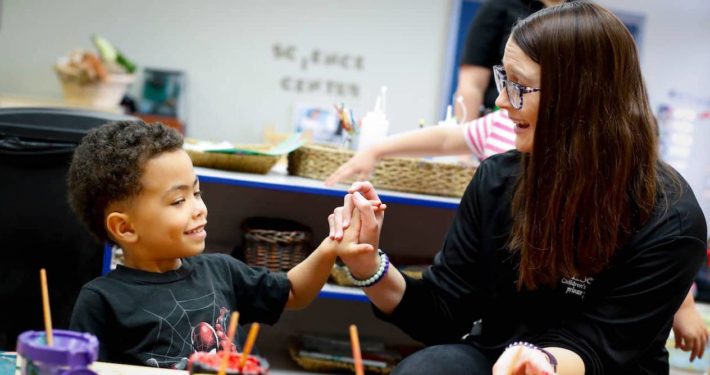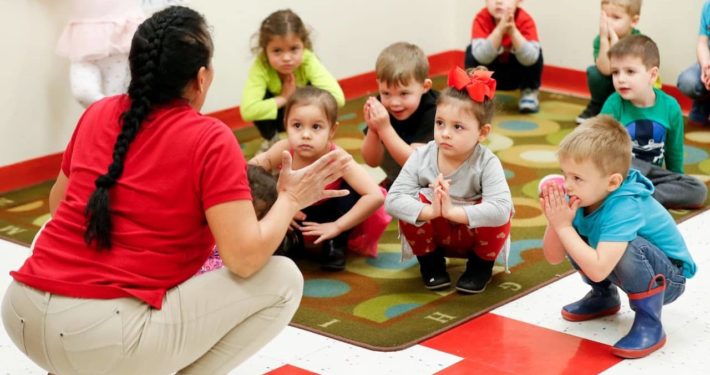Short Answer: Most children start preschool between ages 3 and 4. The most important factor is not the calendar. The best time to begin preschool is when a child demonstrates developmental milestones and emotional readiness that support learning in a social, structured environment.
What Does “Preschool Age” Mean
The term preschool age refers to the developmental stage when a child is ready to learn through play-based learning, cooperative play with friends, simple routines, and daily independence skills. Many preschool programs enroll children from ages 3 through 5. Some children are ready earlier and some are ready later.
The right time to start preschool is when children show readiness across social development, communication skills, emotional regulation, and motor skills.
READ MORE: How To Find The Right Childcare Option For You
How to Know if Your Child Is Ready for Preschool
Readiness is not determined by age alone. Below are the key indicators that early childhood education experts use to evaluate preschool readiness.
1. Emotional Readiness
Preschool becomes a positive experience when children can:
- Handle short periods of separation with reassurance
- Adapt to routines with support
- Accept comfort from trusted caregivers
- Transition between activities with guidance
Some separation anxiety is completely normal. Preschool helps children gradually build confidence with routines away from home.
2. Social-Emotional Skills and Cooperative Play
Social development is a major signal that a child is ready for preschool. Look for:
- Interest in playing with other children
- Taking turns during activities
- Beginning to share toys and materials
- Participation in group play
A child does not need to be completely skilled yet. Preschool exists to strengthen social skills.
3. Independence Skills
Helpful signs include:
- Attempting to dress or feed themselves
- Cleaning up toys with reminders
- Asking adults for help when needed
Preschool supports independence step by step and never expects perfection.
4. Communication Skills
A child does not need advanced language. Preschool readiness looks like:
- Expressing needs with words
- Responding to simple instructions
- Understanding short classroom phrases
Teachers continue to develop communication skills throughout the year.
5. Motor Skills and Physical Development
Children show preschool readiness when they are able to:
- Walk, climb, jump, and move safely across the playground (gross motor skills)
- Build with blocks, scribble with crayons, stack toys, and turn pages (fine motor skills)
Preschool strengthens both types of motor skills with playful, hands-on activities.
6. Potty Training
Many programs prefer children who are potty trained. However, being fully trained is not always required. Comfort and progress are more important than perfection.
Preschool Age by Developmental Stage
Every child begins at a different time. Below is a quick comparison of typical patterns.
| Child’s Age | Typical Development | Suggested Program Fit |
|---|---|---|
| 2 to 3 years | Early curiosity, simple peer interaction, first friendships | Good for toddler bridge programs or early preschool |
| 3 to 4 years | Stronger language skills, growing social confidence, learning routines | Most common preschool age |
| 4 to 5 years | Independence, problem solving, longer attention span, kindergarten preparation | Pre-K program or advanced preschool |
Children can begin preschool at any of these times based on their own growth and family needs.
Signs That Now Might Be the Right Time
Parents often notice:
- A desire to play with other children
- Interest in books, puzzles, coloring, and pretend play
- Curiosity about routines and school-type activities
- Pride in doing things independently
If these feel familiar, your child may be ready for preschool soon.
Why Preschool Matters for Long-Term Development
A high-quality preschool setting builds the skills that support kindergarten and life. With nurturing guidance and play-based learning, children develop:
- Social and emotional development
- Communication and early literacy
- Problem solving and cognitive thinking
- Independence and confidence
- Gross motor skills and fine motor skills
The goal of preschool is growth, connection, and curiosity. Children do not need to arrive already skilled. Preschool helps them get there.
What If Your Child Isn’t Ready?
Many children reach readiness on different timelines. If your child does not check every box, that is perfectly normal. A caring preschool program supports:
- Gradual separation
- Emotional coaching
- Social practice with friendships and turn-taking
- Emerging independence
- Family partnerships during the transition
Preschool does not expect readiness to be complete. Preschool builds readiness.
Preschool Readiness Checklist
If you can answer yes to most of the questions below, your child is likely ready for preschool. A mix of yes and no responses is completely normal. Development looks different for every child, and preschool strengthens the skills that are still growing.
| Question | Yes / No |
|---|---|
| Does my child enjoy playing with other children, including taking turns and participating in simple group activities | ☐ |
| Can my child separate from me with reassurance and return to play after a brief goodbye | ☐ |
| Can my child follow simple directions such as “line up,” “clean up,” or “sit together for circle time” | ☐ |
| Is my child curious about activities, toys, books, and new experiences | ☐ |
| Are fine motor skills and gross motor skills emerging, such as holding crayons, building with blocks, running, or climbing | ☐ |
| Does my child communicate basic needs with words, gestures, or simple sentences | ☐ |
| Does my child show independence during daily routines, such as washing hands, feeding themselves, or helping clean up | ☐ |
How to use the checklist
- If most answers are yes: Your child is likely ready to thrive in preschool and benefit from regular routines, play-based learning, and daily social interaction.
- If some answers are no: Preschool may still be a good fit. Teachers help children strengthen communication skills, cooperative play, independence, and emotional readiness over time.
- If most answers are no: Your child may simply need more time to grow in a familiar environment before transitioning to preschool. Small steps at home or in a toddler program may help build confidence.
Preschool readiness is not about perfection. It is about whether your child can participate with support, build friendships, and feel safe and cared for in a structured learning environment.
How Do You Choose The Right Preschool?
The best preschool for your child should feel supportive and aligned with your family’s values. Look for:
- A curriculum rooted in early childhood education research
- Play-based learning that makes learning joyful
- Teachers who guide social skills and emotional development
- A plan for a gentle preschool transition
- Strong and consistent parent communication
The school should feel like a partnership from the very first conversation.
The Cadence Education Difference
Cadence Education schools focus on supporting every child at every stage of preschool age. Families choose Cadence because our programs provide:
- Teachers trained in early childhood education and child development
- A curriculum built on play-based learning
- A nurturing approach to confidence, independence, friendships, and communication
- Personalized support for separation, routines, and family transitions
- A warm school culture where children feel safe, known, and excited to learn
Whether your child is just beginning preschool or preparing for a pre-K program, Cadence Education meets every learner where they are and celebrates their growth.
Next Step: Find a Preschool Near You
If you are thinking about preschool age and wondering whether now is the right time, the easiest way to determine readiness is to visit a preschool and talk with educators who understand child development.
Cadence Education is here to support you and your child every step of the way.
Tour a classroom, meet teachers, and discover how preschool can help your child grow with confidence.
👉 Find a Cadence Education school near you to schedule a tour.




